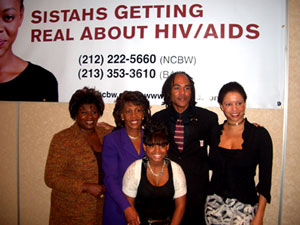
LOS ANGELES (FinalCall.com) – “I’m 21 and I’m celebrating life each day. I continue to speak because when I was in high school, the number of kids that were having sex and the type of sex that they were having was amazing to me … so I continue to speak. I continue to speak because now I have a 14-year-old sister who is infected and I want her to have the same opportunities that I have, to be welcomed and loved by so many people. To my peers, as people we need to wake up. Parents, please talk to your child. How many times do you have to tell us to take out the trash, or do our homework? And don’t just lecture us, speak to us. Have an open conversation. The reason why I do what I do is because I don’t want anybody to go through what I’ve gone through. I’m so happy that we’re finally taking this stand and raising our voices.”
When she was three years old, doctors discovered that Hydeia Broadbent was infected with HIV, and told her new adoptive parents that she would not live to be five. So tearfully speaking these words to approximately 100 Black women and media at the Dec. 1 World AIDS Day Press Conference at the Omni Hotel, the now 21-year-old HIV/AIDS activist helped to convene the First Annual National Black Women and HIV/AIDS Conference, which was sponsored by the Black AIDS Institute, National Association of People with AIDS (NAPWA) and the National Coalition of 100 Black Women.
The four-day event entitled, “It’s All About M.E.E.! (Mobilization, Education, Empowerment) Sistahs Getting Real About HIV,” featured a host of HIV/AIDS activists, advocates, medical and mental health professionals, and celebrities, who tackled issues such as testing, treatment, education and community involvement.
The Black AIDS Institute noted in a Nov. 29 press release that the U.S. Centers for Disease Control and Prevention reported a six-percent drop in infection rates among Black women between the years 2000 and 2003. It deemed the news good and vastly underreported, and further noted that prevention is working.
“During apartheid, Black women would stand at transfer stations to protest the apartheid laws, and they would chant, ‘We are the ones whom we’ve been waiting for,’ because they knew that it was a statement of fact. They knew that they could not wait for someone from somewhere else to come riding in on a white horse to break down the racist African regime; that if there was going to be an end to apartheid, they had to do the ending. That’s the message for us today,” explained Phil Wilson, executive director of the Black AIDS Institute. “You are the ones you’ve been waiting for!”
It’s All About M.E.E. launched several initiatives with local and national impact: 1) “Getting Real: Black Women Taking Charge in the Fight Against AIDS,” the first National Report on the State of AIDS among Black women in America; 2) “Sistahs Getting Real About HIV/AIDS,” the National Black Women and AIDS billboard campaign; and 3) Premiere of “Rap-It-Up,” Black AIDS Short Subject Film competition winner.
Vanessa Beard, representing NAPWA–and hailed by Mr. Wilson as a leading voice to create a patient advocate movement–shared that finding out that she was HIV-positive in 1990, just after graduating law school, changed her entire world and drew her into darkness.
“I was afraid and I wouldn’t talk about it and it was the faces of other women who helped me talk about it and realize that, if I was going to make a contribution to my community, I needed to share my story,” Ms. Beard stated.
Congresswoman Maxine Waters noted that a six-percent reduction in HIV/AIDS infections among Black women is hopeful, but it is not enough. “African Americans, in general, still account for almost half of all the new AIDS cases, about 49 percent, although we’re only 13 percent of the population. African American women still represent nearly 70 percent of all the new AIDS cases among women, and African American teenagers represent 65 percent of all the news AIDS cases among teenagers,” she informed.
Rep. Waters continued that the figures denote that HIV/AIDS is an African American disease that must be dealt with. She challenged Black women to act in accord with their reputation for taking charge.
“What’s wrong with us on this?” she asked. “You don’t have to run away from being called assertive or prove that you’re not like that–let’s be like that. In the final analysis, nobody cares more about you than you care about yourself,” she added.
Conference workshops focused on local, state and federal policy development; influences on sexual health behavior; physicians and clergy leaders embracing, nurturing and healing through spirituality and medicine; African advocates against AIDS; and forming effective partnerships to educate teens and young women about HIV/AIDS.












